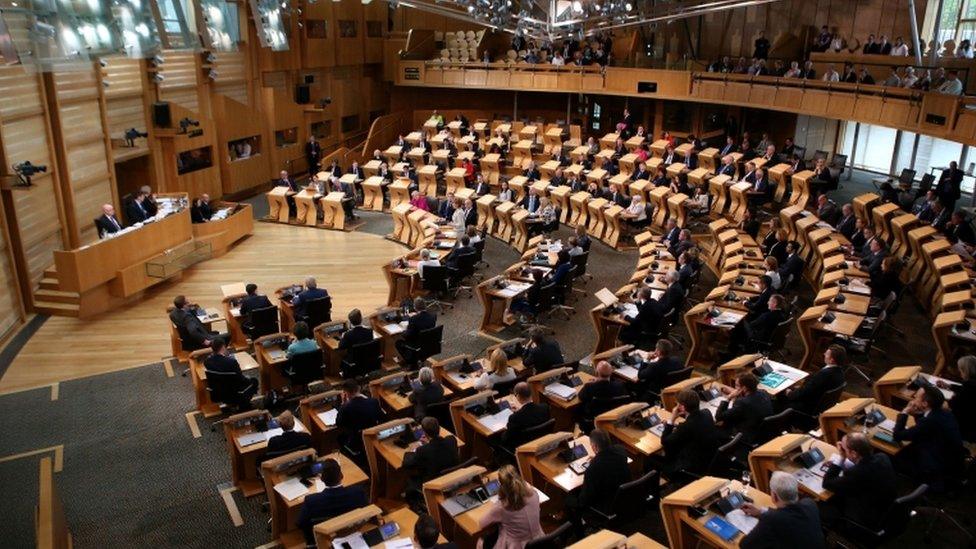Judge retires to 'find answers' in trans law case
- Published

The court action was brought in Scotland's top civil court
A court has heard that a legal bid to expand the definition of the word "women" to include trans people is not discriminatory.
The Court of Session was told the challenge was needed so the Scottish government could comply with equality laws.
Advocate Ruth Crawford QC told judge Lady Wise that proposals to amend the Gender Representation on Public Boards (Scotland) Act 2018 were lawful.
Lady Wise will now review the case.
The gender representation legislation is designed to ensure women account for 50% of appointments to boards of public organisations.
But the proposed redefinition would mean the meaning of "woman" would be broadened.
It would cease to be a "female of any age" and would include trans women, who have the protected characteristics of gender reassignment under the Equality Act 2010.
'Breached women's rights'
On Thursday, advocate Aidan O'Neill QC, who is acting for an organisation called For Women Scotland, told the Court of Session the proposed change was unlawful.
He said it breached women's rights not to be discriminated against on the basis of their sex.
However, on Friday, Ms Crawford, who is acting for the Scottish government, dismissed those submissions.
She said the Holyrood administration had a legal obligation to ensure public boards had memberships which were representative of society.
She said: "It is a legitimate aim to treat trans women as women for the purposes of public board appointments.
"The 2018 act is rationally connected to that. No less intrusive measure could be used and a fair balance has been struck.
"According to the research, trans persons amount to 1% of the population and it is very difficult to see how that cohort even assuming all are trans women, which is unlikely, would disproportionately impact on the over 50% of the population who are women who might wish to seek and be qualified for public board appointments."
Anti-discrimination law
She added: "The question of balance is also addressed by section 44 of the 2018 Act to which attention was drawn yesterday by Mr O'Neill, mainly that an appointing board can prefer another candidate on the situation of characteristic peculiar to that person."
"It is about inclusion of persons with protected characteristics on public boards.
"Nothing in EU law prohibits the Scottish Parliament from legislating trans women as women for the purposes of the 2018 act."
Ms Crawford was speaking on the second day of a judicial review which has been brought to Scotland's highest civil court.
The petition brought by For Women Scotland claims the planned redefinition of "woman" breaches the Equality Act 2010 and decades of anti-discrimination law.

The Scottish government believes it can make changes to gender representation legislation in the Scottish Parliament
The group decided to launch legal action after Scottish ministers informed it earlier this year that they believed they were able to amend the legislation.
On Thursday, Mr O'Neill also told the court the Scottish government was unable to legislate on the matter because it was a matter reserved to the Westminster parliament.
The court also heard that the Equality Act defines sex as being either male or female, or a group of people such as men or boys, or women or girls.
Mr O'Neill also said the case law on sex discrimination defined women on the basis of unique biological features - such as fertility.
However, on Friday, Ms Crawford told Lady Wise that Mr O'Neill had wrongly interpreted the law.
'Limited purpose'
She added: "This case is not about that. This case is concerned with whether or not it was within the legislative competence of the Scottish Parliament to include a trans woman as defined in section two within the definition of section two.
"It is nothing to do with the demarcation between trans women and women. It is for the very limited purpose of including persons with protected characteristics in non executive posts on Scottish public boards.
"It is not discriminatory. It is not contrary to the principles of equal treatment to include a trans woman in the definition of woman in section two."
Ms Crawford told the court that the Scottish government's proposed amendment was in keeping with the law.
Lady Wise told the lawyers she would issue her opinion on the matter sometime in the near future.
She added: "This is an important case. It is a difficult case. I have got to the stage of understanding what the question is but I certainly don't have the answer.
"There is a large volume of written material for me to consider again and for me to consider all the submissions made."
She said she was grateful to all parties and that she would issue a written opinion after consideration.
- Published7 January 2021
